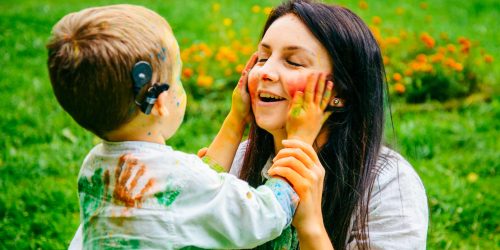NDCS has published a new report on the difference that radio aids can make in the early years. The report can be downloaded from www.ndcs.org.uk/research
and we hope that colleagues will find it helpful and interesting.
The research, commissioned by the National Deaf Children’s Society and carried out by the Ear Foundation, confirms what many of us already know – that the use of radio aids can lead to big increases in parent-child communication. For example, the research found there was a 144% increase in conversational turn-taking when in the car and 88% when outdoors. There was also an increase of 72%, for example, in child vocalisations at nursery when using the radio aid.
Parents were generally very positive about the impact that radio aids had even with very young children and felt that any challenges were significantly outweighed by the benefits. There was a strong preference for wireless, non-bulky devices that were easy to use. The report sets out some of the practical issues they encountered and their views on when radio aids should be fitted.
The report recommends that local authorities ensure that all families with pre-school deaf children have equitable access to radio aids and to review the policies and processes in this area. We are also keen to ensure that parents can access information about the potential benefits, and have the opportunity to try devices out, so that they can make an informed choice on whether to use with their child.
We also know that some services are already currently reviewing their approach to radio aids in the early years in light of the new Quality Standards for the use of personal radio aids.
The first quality standard in this document states that: “Every deaf child should be considered as a potential candidate for provision with a personal radio aid as part of their amplification package, at first hearing aid fitting.”



